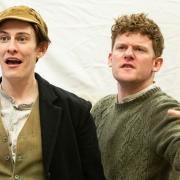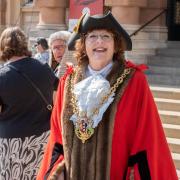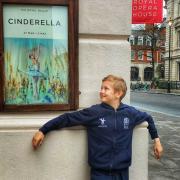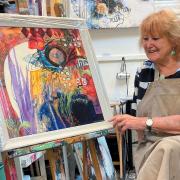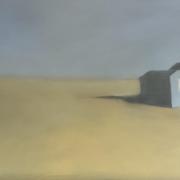Jonathan Schofield gets up very, very early to climb aboard with Dean Fryer

He’s not wearing any gloves. That’s one of the first things I notice about fisherman Dean Fryer.

It’s 5.45am. I’m clad in layers of socks, gloves, fleece and thermals. We’ve been out in his small fishing boat for nearly two hours and as a chill easterly breeze whips across the North Sea I finally ask him how he can bear it.

“Never wear them,” says Dean. “Not even on the coldest winter days. I saw too many fisherman lose fingers when their gloves got caught in equipment. You’ve got a better chance to get your fingers out of the way quickly without them, so I just decided to get used to the cold.”

It’s a reminder that this isn’t a normal job. Normal jobs don’t start on Aldeburgh beach at 3am, which is the time I stumbled bleary-eyed on to the shingle to meet Dean at his hut opposite the White Lion Hotel. At 3.30am, as his 21ft boat slips off the trailer and plunges into the sea, he recalls the mornings when 25 fishing boats would head out into the darkness at this time. Now there are just two.
“Bureaucracy, paperwork, over-the-top EU quotas and the rising costs of simply fuelling and maintaining a boat have driven most fishermen out of the business,” explains Dean. “I’ve been doing this for 33 years, seven days a week weather permitting, and will keep going until my body can’t do it anymore. Despite the difficulties there’s really nothing else I’d rather be doing.”
Dean’s fishing partner, Paul Gittins, known as Pixie, who manoeuvres the trailer to haul the boat in and out of the surf each morning, wades into the crashing waves and clambers aboard. In a world consumed with health and safety, seeing this is as refreshing as the sea breeze whipping in from the east.
Within ten minutes the Suffolk coast has all but disappeared and shooting stars are streaking across the night sky. I can see the distant glow of Felixstowe docks. The orange lights of Sizewell appear and disappear as the tiny fishing boat bobs up and down.
I’m clinging on to the gunwale, daren’t let go, haven’t found my sea legs yet and I’m willing myself not to be seasick. There’s another five hours of this to go yet.
We’re three or four miles out from the coast when Pixie begins laying the nets. Constellations sparkle above us and Dean describes nights where the sea glows with phosphorous, the heavens illuminated by meteor showers, and I begin to see why he could never work in an office.
There’s a faint glow to the east when Dean and Pixie, who have been working together for 18 years, start the most physically demanding part of the day: the hauling in of the nets.
Sole, skate, bass and flounder are removed from the nets in a flash and launched into containers on deck. Soon they are brimming with glistening catch.
As the sun tips over the horizon, the boat jostles through the waves to the 48 lobster and crab pots which are lifted one after the other into the boat. Claws clattering, the catch is whipped out and either tossed back overboard if too small or placed in tubs.
Into the shallows and it’s time to reel in the herring nets as flocks of raucous gulls cloud above the boat. Cockle boats >>
>> King’s Lynn sweep in behind us and I sense the timeless quality of this industry and wonder what the future will bring.
“When I was a boy we’d all wait on the beach for the fisherman to return so we could help unload and sell the fish,” says Dean. “We never see them now, there’s really no interest from young people. I have three daughters who certainly won’t be doing this so it will end with me.
“I wouldn’t encourage youngsters to do this job. There was a time when the authorities supported us, now it feels like they are just waiting to punish you. A small boat like this barely scratches the surface in terms of catch. We were treated differently to the big trawlers once but now it’s just a blanket approach to us all. If the EU says the catch has to be cut by 50% next week, we are all in the same boat. With the price of diesel it can be tough to break even sometimes.”
It’s not all doom and gloom. There are days when the nets are lined with fish, the lobster and crab pots bursting and the holiday makers snapping up the catch as it’s lifted off the boat. Today’s no exception. As we head back to shore there are customers waiting while vans from local restaurants and fish traders pull up.
Standing with them, blade in hand, is flauterer Mick Wilson. Within seconds of the catch being landed he’s gutting and filleting fish with deft, lightning fast flicks of his knife.
For Dean and Pixie the day is far from over. There are lobsters to boil, crabs to dress for the local restaurants, the boat to clean and nets to fix. And that’s when they’re not serving customers from the hut or in the winter baiting thousands of hooks for the next day’s cod fishing.
I watch a holiday maker inspecting the catch and focusing her camera to take a photo. “It’s still alive,” she gasps as one of the fish flips its tail. It’s a stark reminder that we’re becoming disconnected from the food we eat.
The sight of a small inshore fishing boat hauling in a net has all but disappeared from our coast. Periods of overfishing, the development of factory trawlers and strict quotas have eroded to extinction this East Coast industry, but those that remain are a key part of our coastal history and an increasingly rare link to the sea.
Nicolas Hill has formed the Fishing Boat Conservation Fund to paint the fishing boats in Aldeburgh so they can be kept in good condition.
The boats are an icon of the town and a reminder of the centuries-old fishing industry that made Aldeburgh what it is today. Nicolas is keen preserve the boats to ensure they remain a focal point for residents and visitors, as well as inform future generations about Aldeburgh’s past.
The Fishing Boat Conservation Fund is raising money towards refurbishment of the boats. Two – The Viking and Content – have already been restored.
Anyone who would like to make a contribution to the fund can contact the town clerk at the Moot Hall on 01728 452158 or Nicolas Hill on 01728 453269.
Dean’s favourite fish recipe
Simple Dover Sole: grill each side for five minutes maximum with a knob of butter. Lightly salt and add a splash of vinegar before serving
“For me, eating fish is about capturing the taste of the sea so I keep my recipes as simple as possible. Don’t add sauces, don’t cover with any other foods – just cook lightly and serve. If the fish has been caught that day, always wait 24 hours before cooking to allow the meat to settle and the flavour to come out.”




